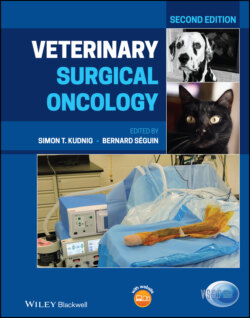Читать книгу Veterinary Surgical Oncology - Группа авторов - Страница 14
1 Principles of Surgical Oncology
ОглавлениеWilliam T.N. Culp and Nicole Ehrhart
Cancer treatment is a rapidly changing and evolving area involving multiple diagnostic and therapeutic modalities to achieve the most optimal outcome. Surgical intervention remains a pivotal aspect of the treatment of cancer. Surgery cures more solid cancers than any other single modality. Nonetheless, the optimal treatment pathway for any given animal patient with cancer most often involves several adjuvant treatment modalities. Adjuvant treatments significantly affect the success of surgery, and likewise, surgery affects the outcome of adjuvant treatments. It is widely recognized in human cancer centers that patient outcome is greatly improved when surgery is performed by a surgeon with specialized training in oncologic procedures. Surgeons trained in these programs have expertise in the selection of surgical treatment options in combination with other forms of cancer treatment, as well as knowledge of the benefits and risks associated with a multidisciplinary approach beyond what can be mastered within a three‐year surgery residency training program. This level of expertise requires an understanding of the fundamental biology of cancer, clinical pharmacology, tumor immunology, and endocrinology, as well as a thorough understanding of potential complications of multimodality therapy. Veterinary training programs in surgical oncology have been in existence for almost 20 years. With the development of novel treatments, the role of the surgical oncologist is constantly evolving and changing (O’Reilly et al. 1997; Drixler et al. 2000).
Therapeutic goals (e.g. curative‐intent, cytoreduction, or palliation) for each case should be established with owners before surgery is initiated. The efficacy of surgical therapy in any patient with cancer is heavily dependent upon the surgeon’s global understanding of the patient’s general health status, lifestyle and activity level, type and stage of cancer, adjuvant therapies available, alternatives to surgery, and expected prognosis. To maximize effectiveness, the optimal treatment pathway for each case should be strategically assessed prior to initiating treatment. This planning should always include a frank and thorough discussion with the owner regarding preoperative diagnostic tests, stage of cancer, palliative options, surgical options, adjuvant treatments likely to be needed, costs, postoperative care and expected function, cosmesis, and prognosis including risks of complications. The goal of this discussion is to provide the owner with enough information to help them make an informed choice regarding the best treatment pathway for their companion. Highly individualized initial planning will allow for the best overall outcome for each patient.
